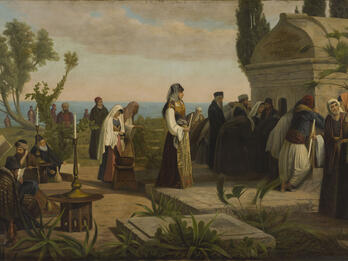Paris, Rome, Jerusalem, or the Religious Question in the Nineteenth Century
In all times of transition such as the one we are now undergoing, on every occasion when human society passes from one era to another era, from one way of doing things to another way of doing them, from one state to another state, innumerable hurdles will arise, with more than one knot to be untied or cut through. Signs and warnings accumulate, deserving to be carefully collected and reflected upon. Societies are required in such times of transition to pass many tests, in religion as well as in politics, before they will be able to unite the most blatant opposition forces. Still more is needed: in order for there to be a lasting solution, two conditions, contradictory at first glance, must be met. On the one hand, the society must evolve as a natural outgrowth of some great tradition of the past; on the other, it must effect a decisive break with that very past.
Consider the status quo, where we now stand. Thanks to the French Revolution—to use some of the beautiful words I have adopted as an epigraph to my letters—thanks to the French Revolution, a new direction, an obvious sequel has been providentially impressed upon one of the two poles around which human affairs revolve: upon politics, that is, taken in its most general sense, in its highest spirit of organization. Far from being limited to one state alone or to one area of the world—Europe—this sequel, this new movement has spread to the most disparate climes. If this first fact is recognized, and if, at the same time, a complete rupture has been effected between the present and the past, how can your soul feel any repugnance to hearing what I have to say? After I have invoked the spirit of French genius, which owes to its precision, to its clarity, the almost universal power it enjoys, will you find it strange to hear me assert that a corresponding change is coming sooner or later to the other pole around which human affairs revolve? Will you find it too extraordinary when I say that religion is destined to burst forth from the depths of its past, its roots, its entrails, a new spirit, a new transformation, an obvious sequel to its beginnings?
Many people, I know, think that one fine day religion fell from the sky perfectly formed, comparable to a statue created by Juno or Pallas, and that since then no human sculptor has added anything or taken anything away. But you do not share in this mistake, an idea, moreover, that crumbles upon the merest scrutiny. In spite of contrary assertions and appearances, nothing is less immutable than sacred dogma, nothing is more susceptible to taking or receiving, depending upon the circumstances, one name or title in place of another. In the history of religion, the idea of coming to terms with heaven or of forcing its gates by no means dates from today or yesterday; it has illustrious precedents and instigators.
Here, as in the whole course of my correspondence with you, I will therefore express myself without circumlocutions, for I will never hide behind oratorical reserve.
So long as the need for a new reconciliation shall not have been acknowledged between the two poles to which I have alluded; so long as a new kind of spirituality, or a new way of understanding the law of heaven shall not have enthusiastically ratified our new secular world, or the new way of determining the condition of peoples and individuals, all your efforts will be in vain. All efforts to reunite the political and social spirit of our new age with the religious structure of the old order will have the same result. In a hundred different ways, you will realize the biblical image of the new piece of cloth attached to an old garment, where only tears can stand out. From then on, whatever name you choose, whatever principle upon which you wish to stand, whatever external successes seem to promise new strength, the earth, at the slightest quake, will tremble under your feet, and if it is the sea, its chasms will open wide for you. The most capable men of our time, those who are most confident in the time-honored infallibility attributed to their opinions, will only succeed in introducing palliatives, the weakness of which will be only too evident. Never will they be permitted to hold in their hands the increasingly tangled thread of universal affairs; never will they be granted sufficient moral authority to disentangle them.
Credits
Published in: The Posen Library of Jewish Culture and Civilization, vol. 6.



